31 dec 2017
|
|
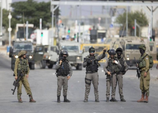
Israeli soldiers invaded, on Sunday morning, the village of Deir Nitham, northwest of the central West Bank city of Ramallah, broke into and ransacked homes, and forced children out of their schools after invading them.
Safi Tamimi, the coordinator of the Land Defense Committee in Deir Nitham, said that many armored military jeeps, and a bulldozer, invaded the village, at dawn, before closing its main entrance.
Tamimi added that the soldiers then broke into and ransacked many homes, and occupied the rooftops of the home of the village’s Imam, Fadel Abdul-Hamid, in addition to Asif Hussein Diab, and broke into the Local Council building.
On Sunday morning, the soldiers invaded many schools in the village, while the students were conducting their mid-term exams, and forced them out of their schools.
It is worth mentioning that the soldiers invaded many schools, Saturday, in the village, an issue that caused many to hurl stones at the soldiers, while the army fired gas bombs, causing dozens of students to suffer the effects of teargas inhalation.
It is worth mentioning that the soldiers broke into a school in the al-Khader town, south of Bethlehem, while the students were conducting the mid-term exams, and fired many gas bombs and concussion grenades.
The soldiers also fired gas bombs and concussion grenades at the students, while leaving their school. Video
Safi Tamimi, the coordinator of the Land Defense Committee in Deir Nitham, said that many armored military jeeps, and a bulldozer, invaded the village, at dawn, before closing its main entrance.
Tamimi added that the soldiers then broke into and ransacked many homes, and occupied the rooftops of the home of the village’s Imam, Fadel Abdul-Hamid, in addition to Asif Hussein Diab, and broke into the Local Council building.
On Sunday morning, the soldiers invaded many schools in the village, while the students were conducting their mid-term exams, and forced them out of their schools.
It is worth mentioning that the soldiers invaded many schools, Saturday, in the village, an issue that caused many to hurl stones at the soldiers, while the army fired gas bombs, causing dozens of students to suffer the effects of teargas inhalation.
It is worth mentioning that the soldiers broke into a school in the al-Khader town, south of Bethlehem, while the students were conducting the mid-term exams, and fired many gas bombs and concussion grenades.
The soldiers also fired gas bombs and concussion grenades at the students, while leaving their school. Video
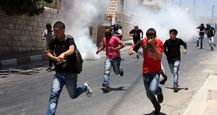
The Israeli occupation forces (IOF) on Sunday morning clashed with Palestinian school students in Burin town, south of Nablus in the West Bank.
Ibrahim Amran, the principal of the Burin high school, told the Palestinian Information Center (PIC) that skirmishes broke out between students from his school and soldiers at a nearby military watchtower.
He added that the soldiers fired tear gas at the students to disperse them, and luckily no one was hurt during the events.
For the fourth week running, the occupied Palestinian territories in the West Bank and Jerusalem have been seeing angry protests and clashes with Israeli soldiers in response to the US recognition of Jerusalem as Israel’s capital.
Ibrahim Amran, the principal of the Burin high school, told the Palestinian Information Center (PIC) that skirmishes broke out between students from his school and soldiers at a nearby military watchtower.
He added that the soldiers fired tear gas at the students to disperse them, and luckily no one was hurt during the events.
For the fourth week running, the occupied Palestinian territories in the West Bank and Jerusalem have been seeing angry protests and clashes with Israeli soldiers in response to the US recognition of Jerusalem as Israel’s capital.
29 dec 2017
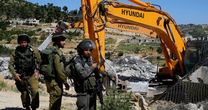
The Israeli occupation authorities notified on Thursday the demolition of Palestinian homes, a Mosque, and a school in al-Khalil’s southern town of Yatta.
Activist Rateb Jabour said the Israeli authorities handed over nine demolition notifications targeting seven Palestinian homes owned by al-Azazma family, along with a school and a mosque in al-Bireen, north of Yatta.
Activist Rateb Jabour said the Israeli authorities handed over nine demolition notifications targeting seven Palestinian homes owned by al-Azazma family, along with a school and a mosque in al-Bireen, north of Yatta.
26 dec 2017
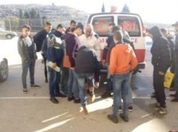
Palestinian medical sources have reported, Tuesday, that many schoolchildren suffered the severe effects of teargas inhalation, after dozens of soldiers invaded Ya’bad town, and stormed the school while firing gas bombs and rubber-coated steel bullets.
Media sources in Jenin said the soldiers fired many concussion grenades and gas bombs at the Ezzeddin Al-Qassam School, after invading its yard, while the students were behind their desks during the mid-term exams.
They added that dozens of children suffered the effects of teargas inhalation, while many others suffered anxiety attacks, before Red Crescent medics rushed to the school and provided them with the needed treatment.
Tareq Alawna, the head of the Education Department in Jenin, said the soldiers have been sporadically carrying out these provocative invasions and violations, and added that the soldiers shot and killed a student, identified as Fuad Turkman, during an invasion into the school seven years ago.
Alawna stated that the army deliberately targets the students, and the educational process, in different parts of the occupied West Bank.
It is worth mentioning that the soldiers are constantly deployed near the school, and conduct ongoing violations and provocative acts against the students.
Media sources in Jenin said the soldiers fired many concussion grenades and gas bombs at the Ezzeddin Al-Qassam School, after invading its yard, while the students were behind their desks during the mid-term exams.
They added that dozens of children suffered the effects of teargas inhalation, while many others suffered anxiety attacks, before Red Crescent medics rushed to the school and provided them with the needed treatment.
Tareq Alawna, the head of the Education Department in Jenin, said the soldiers have been sporadically carrying out these provocative invasions and violations, and added that the soldiers shot and killed a student, identified as Fuad Turkman, during an invasion into the school seven years ago.
Alawna stated that the army deliberately targets the students, and the educational process, in different parts of the occupied West Bank.
It is worth mentioning that the soldiers are constantly deployed near the school, and conduct ongoing violations and provocative acts against the students.
24 dec 2017

The Israeli occupation forces (IOF) on Sunday morning kidnapped two young Palestinian citizens in al-Khalil city, south of the West Bank.
Local sources told the Palestinian Information Center (PIC) that Israeli soldiers near the Ibrahimi Mosque stopped a group of school children and brutalized them and were about to detain them when a young man called Yusri Taha intervened and protected them. Video
However, the soldiers subdued and arrested the young man instead and took him to an unknown place, the sources added.
Meanwhile, Israeli soldiers intercepted and arrested a school girl as she was going home from school in an area near Halhoul city, north of al-Khalil.
Local sources said that the soldiers waylaid the girl and restrained her before taking her away. The identity of the girl is still unknown.
Local sources told the Palestinian Information Center (PIC) that Israeli soldiers near the Ibrahimi Mosque stopped a group of school children and brutalized them and were about to detain them when a young man called Yusri Taha intervened and protected them. Video
However, the soldiers subdued and arrested the young man instead and took him to an unknown place, the sources added.
Meanwhile, Israeli soldiers intercepted and arrested a school girl as she was going home from school in an area near Halhoul city, north of al-Khalil.
Local sources said that the soldiers waylaid the girl and restrained her before taking her away. The identity of the girl is still unknown.
20 dec 2017
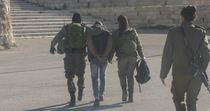
Israeli Occupation Forces (IOF) on Wednesday morning arrested a Palestinian young man at Abu al-Rish barrier near al-Ibrahimi Mosque in al-Khalil after alleged stabbing attempt.
Local sources told the PIC reporter that IOF soldiers claimed that they found a knife in the man’s possession while passing through the barrier.
Meanwhile, clashes broke out between school students and IOF soldiers after school time in the afternoon.
Palestinian factions called for suspending school time after 11 a.m. in the city and announcing a day of anger in protest at the US decision to recognize Jerusalem as capital of Israel.
Local sources told the PIC reporter that IOF soldiers claimed that they found a knife in the man’s possession while passing through the barrier.
Meanwhile, clashes broke out between school students and IOF soldiers after school time in the afternoon.
Palestinian factions called for suspending school time after 11 a.m. in the city and announcing a day of anger in protest at the US decision to recognize Jerusalem as capital of Israel.
19 dec 2017

Israeli soldiers invaded, Tuesday, Deir Nitham Palestinian village, west of the central West Bank city of Ramallah, and fired gas bombs into a local school, causing dozens of children to suffer the severe effects of teargas inhalation.
Medical sources said at least 280 children were in school, when the soldiers fired the gas bombs at it.
The army surrounded the school and several nearby neighborhoods, and were trying to prevent the Palestinian from marching in their own town.
It is worth mentioning that the soldiers have been frequently invading the village, and breaking into homes, especially at dawn, and abducted many Palestinians, including children. Video
Medical sources said at least 280 children were in school, when the soldiers fired the gas bombs at it.
The army surrounded the school and several nearby neighborhoods, and were trying to prevent the Palestinian from marching in their own town.
It is worth mentioning that the soldiers have been frequently invading the village, and breaking into homes, especially at dawn, and abducted many Palestinians, including children. Video
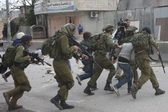
Israeli soldiers abducted, on Tuesday morning, two Palestinian children from Betunia town, west of the central West Bank city of Ramallah, and caused many schoolchildren to suffer the effects of teargas inhalation.
Media sources in Ramallah said the soldiers invaded the town, and fired many gas bombs at schools, causing many children, and residents in nearby homes, to suffer the effects of teargas inhalation.
The soldiers also searched and ransacked homes, and abducted two children, before moving them to an unknown destination. Video
Media sources in Ramallah said the soldiers invaded the town, and fired many gas bombs at schools, causing many children, and residents in nearby homes, to suffer the effects of teargas inhalation.
The soldiers also searched and ransacked homes, and abducted two children, before moving them to an unknown destination. Video
18 dec 2017

A few lucky children will receive the wonderful new book, P is for Palestine: A Palestine Alphabet Book, this holiday season. Those whose parents have snoozed on placing their order will need to wait till spring of 2018, as the initial print run of 2,000 copies sold out within 10 days of publication.
A second printing is scheduled for next year, and pre-orders are being taken now.
A positive image
The book is a welcome and much-needed addition to English-speaking households who want to provide their children with a positive image of the Arab world, and Palestine in particular.
In the author's words, it is "a book for children of all ages where the story of Palestine is told as simply as the English ABC…in an educational, colourful, empowering way, showcasing the beauty and strength of Palestinian culture".
The author, Iranian-born and New York-based Golbarg Bashi, said she conceived of the idea "when she couldn't find such a book for her own children and for the school visits she regularly conducts in New York City public schools. She's in the habit of buying or borrowing books about cities, countries, and artists whenever she and her family are travelling to those destinations".
Dr Bashi then asked illustrator Golrokh Nafisi if she'd be interested in working on a book about Palestine, and the two soon teamed up, to create the children's book.
A genuine celebration of the historical diversity of Palestine, the book does a stellar job of reminding Westerners, many of whom believe Christianity is a Western religion, that it is Palestine that is the birthplace of Christianity.
Hence, in addition to "B is for Bethlehem", we read that "C is for Christmas, coziest in Jesus Christ's country, with the crunchiest candy," "J is for Jesus", (Jerusalem is referred to by its Arabic name, Al-Quds), and "N is for Nazareth".
But the cheerful little book, in which a curly-haired young girl guides us through her homeland, explaining "D is for Dabkeh", "F is for Falafel", and "K is for Kuffiya", seems to have garnered the wrath of Zionists.
They are particularly incensed by one spread, the letter "I".
"I is for Intifada," the book explains."Intifada is Arabic for rising up for what's right, if you are a kid or a grown up!" and the accompanying illustration is of the young girl on her father's back, raising peace signs behind barbed wire.
Death threats
The author has received death threats, and a handful of rabbis have forced an independent bookstore chain in New York, Book Culture, to issue an apology for advertising the book, thus potentially intimidating other bookstores into not stocking it when the second printing is out.
According to Book Culture's owner, Chris Doeblin, the last time the store faced such threats was decades ago, after Iran issued a fatwa on Salman Rushdie for The Satanic Verses.
The author's statement insists: "P is for Palestine, and I is for Intifada. It would be irresponsible of an author of a book for Palestinian children (e.g. Native American children) to ignore or whitewash the fact that their people have a resistance movement, most of which is manifested in peaceful protest."
And Dr Bashi continues, defiantly: "My sense of moral responsibility emerged in those refugee camps, not among the self-proclaimed powerful neighbourhoods of New York City who racially profile me, incite hatred and violence against my person and my social-impact start-up, and issue edicts to boycott and shut down bookstores for having dared to sell [the] world's first English language alphabet book on Palestine."
Book Culture's apology, posted on the website of the synagogue which pressured it into apologising for their support of the book, is particularly egregious, when one reads that the store's mission is "to represent as widely as we can the diverse output of the publishing industry - the unique, the scholarly, the under-represented, the under-read."
Only two months earlier, Book Culture was celebrating Banned Books Week, an annual event educating the public on the problems of book censorship.
The apology repeats the contrite verbiage issued by public libraries, universities and theatres around the country that have been bullied into cancelling Palestine justice events, as the owners of Book Culture had to write:
"We regret that we did not fully appreciate the political or communal ramifications of the children's book P is for Palestine by Dr Golbarg Bashi, nor did we anticipate the pain and distress it has caused in our community. We now understand these much better. We oppose terrorism or other forms of violence perpetrated against Israeli civilians during the intifada or thereafter. Any impression from the book to the contrary is not our view. We support Israel's right to exist. We do not endorse the Boycott, Divestment and Sanctions movement (BDS)."
No reference to occupation
Naturally, there is no reference in that apology to the violence and illegality of the Israeli occupation, the decades of Palestinian suffering and losses, nor to the fact that BDS is non-violent resistance.
In the meantime, in a development that shows the power of intersectional alliances against systemic, racist oppression, Jewish allies are expressing their support of the author, and the book, by organising two public readings during Hannukah, one in New York, the other in Philadelphia.
When the book is reprinted in Spring, maybe it should read "A is for Arabic, B is for Bethlehem, C is for Censorship, because Zionists cannot handle pro-Palestinian narratives
The organisers of the New York event explained: "On Sunday, the fifth day of Hanukkah, we will gather to share the gift of story with our children and to celebrate the Palestinian struggle for freedom. The traditional Hanukkah story tells of a small amount of oil that burned for eight days, reminding us that we have enough and challenging us to realise together what is possible."
"Since this book was released," the organisers continue, "there's been an outcry that 'intifada' is a bad word. But it's not: It means rising up to resist injustice. We must all do that now, and in Jewish tradition, Hanukkah is a special time to remember that.
"When the book is reprinted in spring, maybe it should read "A is for Arabic, B is for Bethlehem, C is for Censorship, because Zionists cannot handle pro-Palestinian narratives."
In the meantime, as those of us who have placed orders for the second print await our copy, would current owners of the precious book host more readings, please? World Arabic Language Day, a global celebration of Palestine's language, and of cultural diversity, would be a wonderful opportunity.
- Nada Elia is a Diaspora Palestinian writer and political commentator. A professor of Gender and Global Studies (retired), she is a member of the steering collective of the US Campaign for the Academic and Cultural Boycott of Israel (USACBI). Her article appears on the Middle East Eye website.
A second printing is scheduled for next year, and pre-orders are being taken now.
A positive image
The book is a welcome and much-needed addition to English-speaking households who want to provide their children with a positive image of the Arab world, and Palestine in particular.
In the author's words, it is "a book for children of all ages where the story of Palestine is told as simply as the English ABC…in an educational, colourful, empowering way, showcasing the beauty and strength of Palestinian culture".
The author, Iranian-born and New York-based Golbarg Bashi, said she conceived of the idea "when she couldn't find such a book for her own children and for the school visits she regularly conducts in New York City public schools. She's in the habit of buying or borrowing books about cities, countries, and artists whenever she and her family are travelling to those destinations".
Dr Bashi then asked illustrator Golrokh Nafisi if she'd be interested in working on a book about Palestine, and the two soon teamed up, to create the children's book.
A genuine celebration of the historical diversity of Palestine, the book does a stellar job of reminding Westerners, many of whom believe Christianity is a Western religion, that it is Palestine that is the birthplace of Christianity.
Hence, in addition to "B is for Bethlehem", we read that "C is for Christmas, coziest in Jesus Christ's country, with the crunchiest candy," "J is for Jesus", (Jerusalem is referred to by its Arabic name, Al-Quds), and "N is for Nazareth".
But the cheerful little book, in which a curly-haired young girl guides us through her homeland, explaining "D is for Dabkeh", "F is for Falafel", and "K is for Kuffiya", seems to have garnered the wrath of Zionists.
They are particularly incensed by one spread, the letter "I".
"I is for Intifada," the book explains."Intifada is Arabic for rising up for what's right, if you are a kid or a grown up!" and the accompanying illustration is of the young girl on her father's back, raising peace signs behind barbed wire.
Death threats
The author has received death threats, and a handful of rabbis have forced an independent bookstore chain in New York, Book Culture, to issue an apology for advertising the book, thus potentially intimidating other bookstores into not stocking it when the second printing is out.
According to Book Culture's owner, Chris Doeblin, the last time the store faced such threats was decades ago, after Iran issued a fatwa on Salman Rushdie for The Satanic Verses.
The author's statement insists: "P is for Palestine, and I is for Intifada. It would be irresponsible of an author of a book for Palestinian children (e.g. Native American children) to ignore or whitewash the fact that their people have a resistance movement, most of which is manifested in peaceful protest."
And Dr Bashi continues, defiantly: "My sense of moral responsibility emerged in those refugee camps, not among the self-proclaimed powerful neighbourhoods of New York City who racially profile me, incite hatred and violence against my person and my social-impact start-up, and issue edicts to boycott and shut down bookstores for having dared to sell [the] world's first English language alphabet book on Palestine."
Book Culture's apology, posted on the website of the synagogue which pressured it into apologising for their support of the book, is particularly egregious, when one reads that the store's mission is "to represent as widely as we can the diverse output of the publishing industry - the unique, the scholarly, the under-represented, the under-read."
Only two months earlier, Book Culture was celebrating Banned Books Week, an annual event educating the public on the problems of book censorship.
The apology repeats the contrite verbiage issued by public libraries, universities and theatres around the country that have been bullied into cancelling Palestine justice events, as the owners of Book Culture had to write:
"We regret that we did not fully appreciate the political or communal ramifications of the children's book P is for Palestine by Dr Golbarg Bashi, nor did we anticipate the pain and distress it has caused in our community. We now understand these much better. We oppose terrorism or other forms of violence perpetrated against Israeli civilians during the intifada or thereafter. Any impression from the book to the contrary is not our view. We support Israel's right to exist. We do not endorse the Boycott, Divestment and Sanctions movement (BDS)."
No reference to occupation
Naturally, there is no reference in that apology to the violence and illegality of the Israeli occupation, the decades of Palestinian suffering and losses, nor to the fact that BDS is non-violent resistance.
In the meantime, in a development that shows the power of intersectional alliances against systemic, racist oppression, Jewish allies are expressing their support of the author, and the book, by organising two public readings during Hannukah, one in New York, the other in Philadelphia.
When the book is reprinted in Spring, maybe it should read "A is for Arabic, B is for Bethlehem, C is for Censorship, because Zionists cannot handle pro-Palestinian narratives
The organisers of the New York event explained: "On Sunday, the fifth day of Hanukkah, we will gather to share the gift of story with our children and to celebrate the Palestinian struggle for freedom. The traditional Hanukkah story tells of a small amount of oil that burned for eight days, reminding us that we have enough and challenging us to realise together what is possible."
"Since this book was released," the organisers continue, "there's been an outcry that 'intifada' is a bad word. But it's not: It means rising up to resist injustice. We must all do that now, and in Jewish tradition, Hanukkah is a special time to remember that.
"When the book is reprinted in spring, maybe it should read "A is for Arabic, B is for Bethlehem, C is for Censorship, because Zionists cannot handle pro-Palestinian narratives."
In the meantime, as those of us who have placed orders for the second print await our copy, would current owners of the precious book host more readings, please? World Arabic Language Day, a global celebration of Palestine's language, and of cultural diversity, would be a wonderful opportunity.
- Nada Elia is a Diaspora Palestinian writer and political commentator. A professor of Gender and Global Studies (retired), she is a member of the steering collective of the US Campaign for the Academic and Cultural Boycott of Israel (USACBI). Her article appears on the Middle East Eye website.
17 dec 2017

The Israeli army’s civil administration last Tuesday, December 12, delivered a demolition order against the only school in the Bedouin community of Abu al-Nawwar, east of Occupied Jerusalem.
Spokesman for the Jerusalem Bedouin communities Abu Imad al-Jahhalin told the Palestinian Information Center (PIC) that employees from the civil administration escorted by soldiers stormed Abu al-Nawwar hamlet and put up a demolition order giving the residents 72 hours before they come again to remove the school structures.
Jahhalin affirmed that a lawyer had obtained an injunction from the Israeli high court of justice extending the deadline given for the demolition of the school until next Thursday, but the civil administration could come any moment to raze it.
He noted that Abu al-Nawwar school had been demolished four times before during 2016, stressing that such Israeli measure would not intimidate the local residents.
Israel’s systematic demolition activities against Palestinian homes and structures in Bedouin hamlets of east Jerusalem is aimed at forcing the residents to leave their areas there in order to complete its settlement project “E1.”
Settlement construction in E1 area is considered one of the most settlement plans that aim to isolate the south of the West Bank from its north and tighten Israel’s grip over the holy city.
Spokesman for the Jerusalem Bedouin communities Abu Imad al-Jahhalin told the Palestinian Information Center (PIC) that employees from the civil administration escorted by soldiers stormed Abu al-Nawwar hamlet and put up a demolition order giving the residents 72 hours before they come again to remove the school structures.
Jahhalin affirmed that a lawyer had obtained an injunction from the Israeli high court of justice extending the deadline given for the demolition of the school until next Thursday, but the civil administration could come any moment to raze it.
He noted that Abu al-Nawwar school had been demolished four times before during 2016, stressing that such Israeli measure would not intimidate the local residents.
Israel’s systematic demolition activities against Palestinian homes and structures in Bedouin hamlets of east Jerusalem is aimed at forcing the residents to leave their areas there in order to complete its settlement project “E1.”
Settlement construction in E1 area is considered one of the most settlement plans that aim to isolate the south of the West Bank from its north and tighten Israel’s grip over the holy city.
14 dec 2017
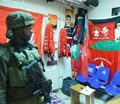
The Israeli occupation forces (IOF) at dawn Thursday kidnapped several Palestinian citizens from their homes, and raided stores for printing services and student buildings in Birzeit University during campaigns in different West Bank areas.
Eight Palestinians were taken prisoners during the IOF campaigns in the West Bank at dawn, according to different local sources.
In al-Khalil, the IOF broke into and ransacked several homes belonging to families of ex-detainees, without making arrests. However, the ex-detainees were handed summonses for interrogation from the Shin Bet.
Several ex-detainees in the West Bank also reported receiving phone calls from Shin Bet officers threatening to arrest them if they participated in any activities marking the founding anniversary of Hamas.
In a separate incident, the IOF stormed at dawn several businesses providing printing services in Nablus city.
Local sources said that Israeli soldiers searched at least three presses in the eastern area of Nablus to look for posters or any publicity material related to Hamas.
Meanwhile, violent clashes reportedly took place between local young men and Israeli soldiers in al-Quds street of Nablus and at the entrance to Balata refugee camp.
The IOF also raided student headquarters on Birzeit University’s campus, including the offices of the Islamic Bloc, and confiscated all their contents.
The Islamic Bloc, the student wing of Hamas, organized on Wednesday a festival to mark the 30th founding anniversary of the Movement.
Israeli Soldiers Abduct Three Palestinians, Invade Print Shops And Colleges
Israeli soldiers abducted, on Thursday at dawn, at least three Palestinians, installed many roadblocks, in addition to invading two print shops, Birzeit University, and the al-Quds University, in the occupied West Bank.
Media sources in Hebron, said the soldiers invaded homes in Sa’ir town, east of the city, and abducted Mohannad Yasser Shalalda.
The soldiers also invaded “Infiniti” P in the Salam Street, in Hebron city, and violently searched it, causing damage.
Furthermore, the soldiers installed many roadblocks at main junctions and roads in Hebron city, in addition to several surrounding villages, towns and refugee camps, and increased the military deployment on roadblocks at the main entrance of the al-Fawwar refugee camp, Beit ‘Einun Junction, east of Hebron, and al-Fahs area, south of the city, before stopping and searching dozens of cars, and interrogated many Palestinians while inspecting their ID cards.
The soldiers also invaded homes in ad-Dahra area, in the al-‘Isawiya town, in the center of occupied Jerusalem, and abducted a child, identified as Mahmoud Omran Mustafa, 14.
Another Palestinian, identified as Laith Sami Shehada, was abducted from his home in Abu Dis town, southeast of Jerusalem.
In addition, the soldiers invaded the eastern area of the northern West Bank city of Nablus, and stormed three print shops before violently searching them.
The soldiers invaded “al-Manahil Printshop,” owned by Thouqan family, near Balata refugee camp, in addition to “Artistic Touch Printshop,” owned by al-Khatib family in the al-Quds Street in Nablus city, and Hijjawi Printshop in the Industrial Zone, before violently searching them.
In related news, dozens of soldiers invaded Birzeit University, north of Ramallah in central West Bank, and destroyed the door of the Students’ Senate, before confiscating Palestinian flags, and flags for several factions, in addition to many books and stationary.
The soldiers also invaded the Al-Quds University, in Abu Dis town, before storming the Students’ Senate, and confiscated many signs, flags, books and other materials, during violent searches, leading to excessive damage.
The soldiers also abducted Laith Sami Awwad, a student of Al-Quds University, after storming and searching his home in Abu Dis.
Invasions into campuses and educational facilities are direct violations of International Law, but the army conducts frequent invasions into various campuses and schools in occupied Palestine, and fires live rounds, rubber-coated steel bullets, gas bombs and concussion grenades, in addition to abducting many students and staffers.
Earlier this week, the soldiers invaded the campus of Palestine Technical College, in al-’Arroub, north of Hebron, and abducted a student from a Palestinian ambulance.
The soldiers also invaded Palestine Technical University – Kadoorie, in Tulkarem, in northern West Bank.
Eight Palestinians were taken prisoners during the IOF campaigns in the West Bank at dawn, according to different local sources.
In al-Khalil, the IOF broke into and ransacked several homes belonging to families of ex-detainees, without making arrests. However, the ex-detainees were handed summonses for interrogation from the Shin Bet.
Several ex-detainees in the West Bank also reported receiving phone calls from Shin Bet officers threatening to arrest them if they participated in any activities marking the founding anniversary of Hamas.
In a separate incident, the IOF stormed at dawn several businesses providing printing services in Nablus city.
Local sources said that Israeli soldiers searched at least three presses in the eastern area of Nablus to look for posters or any publicity material related to Hamas.
Meanwhile, violent clashes reportedly took place between local young men and Israeli soldiers in al-Quds street of Nablus and at the entrance to Balata refugee camp.
The IOF also raided student headquarters on Birzeit University’s campus, including the offices of the Islamic Bloc, and confiscated all their contents.
The Islamic Bloc, the student wing of Hamas, organized on Wednesday a festival to mark the 30th founding anniversary of the Movement.
Israeli Soldiers Abduct Three Palestinians, Invade Print Shops And Colleges
Israeli soldiers abducted, on Thursday at dawn, at least three Palestinians, installed many roadblocks, in addition to invading two print shops, Birzeit University, and the al-Quds University, in the occupied West Bank.
Media sources in Hebron, said the soldiers invaded homes in Sa’ir town, east of the city, and abducted Mohannad Yasser Shalalda.
The soldiers also invaded “Infiniti” P in the Salam Street, in Hebron city, and violently searched it, causing damage.
Furthermore, the soldiers installed many roadblocks at main junctions and roads in Hebron city, in addition to several surrounding villages, towns and refugee camps, and increased the military deployment on roadblocks at the main entrance of the al-Fawwar refugee camp, Beit ‘Einun Junction, east of Hebron, and al-Fahs area, south of the city, before stopping and searching dozens of cars, and interrogated many Palestinians while inspecting their ID cards.
The soldiers also invaded homes in ad-Dahra area, in the al-‘Isawiya town, in the center of occupied Jerusalem, and abducted a child, identified as Mahmoud Omran Mustafa, 14.
Another Palestinian, identified as Laith Sami Shehada, was abducted from his home in Abu Dis town, southeast of Jerusalem.
In addition, the soldiers invaded the eastern area of the northern West Bank city of Nablus, and stormed three print shops before violently searching them.
The soldiers invaded “al-Manahil Printshop,” owned by Thouqan family, near Balata refugee camp, in addition to “Artistic Touch Printshop,” owned by al-Khatib family in the al-Quds Street in Nablus city, and Hijjawi Printshop in the Industrial Zone, before violently searching them.
In related news, dozens of soldiers invaded Birzeit University, north of Ramallah in central West Bank, and destroyed the door of the Students’ Senate, before confiscating Palestinian flags, and flags for several factions, in addition to many books and stationary.
The soldiers also invaded the Al-Quds University, in Abu Dis town, before storming the Students’ Senate, and confiscated many signs, flags, books and other materials, during violent searches, leading to excessive damage.
The soldiers also abducted Laith Sami Awwad, a student of Al-Quds University, after storming and searching his home in Abu Dis.
Invasions into campuses and educational facilities are direct violations of International Law, but the army conducts frequent invasions into various campuses and schools in occupied Palestine, and fires live rounds, rubber-coated steel bullets, gas bombs and concussion grenades, in addition to abducting many students and staffers.
Earlier this week, the soldiers invaded the campus of Palestine Technical College, in al-’Arroub, north of Hebron, and abducted a student from a Palestinian ambulance.
The soldiers also invaded Palestine Technical University – Kadoorie, in Tulkarem, in northern West Bank.
